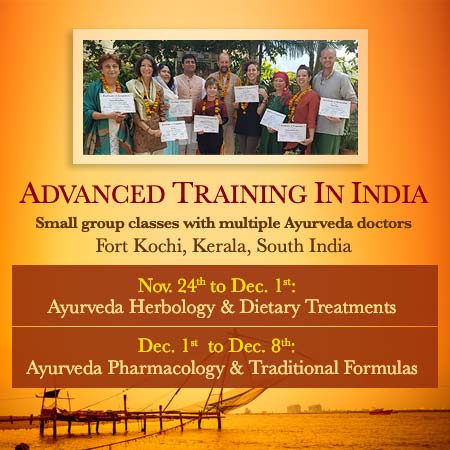8-day 200 hr workshop: Herbal Pharmacology & Traditional Formulas of Ayurveda

Herbal Pharmacology and Traditional Formulas of Ayurveda
- Dec. 1st to Dec 8th, 2019
"In this course, we immerse in traditional herbal formulas by discussing, tasting and even trying each formula. To know an herb or a formula you have to feel it, and this type of immersion creates deep understanding that won't be forgotten..." Khabir
About the Programs
These intensive workshops are about learning the skills necessary to practice Ayurveda in a clinical environment based on traditional Ayurvedic principles (Charaka & Samhita), methodologies of treatment (kayachikitsa) as per Northern India, Ayurvedic herbology (dravyaguna) and Ayurvedic pharmacology (Bhaisajya Kalpanaa). Note: The northern Indian approach is almost entirely herbal compared with the southern or the "Kerala approach" where abhyanga, the use of oils, sweating therapies, Shirodhara and panchakarma are the main methods of treatment. Thus, these workshops do not cover these physical forms of treatment or any form of bodywork, since a purely herbal and dietary approach is sufficient if the practitioner is skilled.
This teaching format is in the traditional teacher-student approach or gurukul in India for those who want hands-on training in Ayurvedic health-care (kayachikitsa) by experienced Ayurvedic Doctors and Vaidya. Most courses on Ayurveda are more focused on theory than clinical application, or too academic, with references to original sanskrit texts requiring an understanding of Sanskrit terminology. The goal of these workshops is to help [western] students and practitioners of Ayurveda to better grasp the functional and clinical applications of Ayurveda and provide a model of private practice that can be used in the West.
Each full day, there are 5 hours of small group teaching with 3 hours in the morning and 2 hours in the late afternoon. The classes are straightforward and clear without much Sanskrit terminology using modern english textbooks by Vasant Lad, Atreya Smith and others.
Herbal Pharmacology and Traditional Formulas of Ayurveda
Course Syllabus
Textbook: Volume Three: General Principles of Management and Treatment by Vasant Lad (Amazon)
200 hours of training
- Self study before the course: 150 hours
- Teaching by Khabir (India) – 8 days, 30 hours
- Group and individual study in India: 20 hours
Overview:
Event Details
| Date & Start Time | 12-01-2019 5:00 pm |
| End Time & Date | 12-08-2019 2:00 pm |
| Capacity | 8 |
| Cost(s) | $750 |